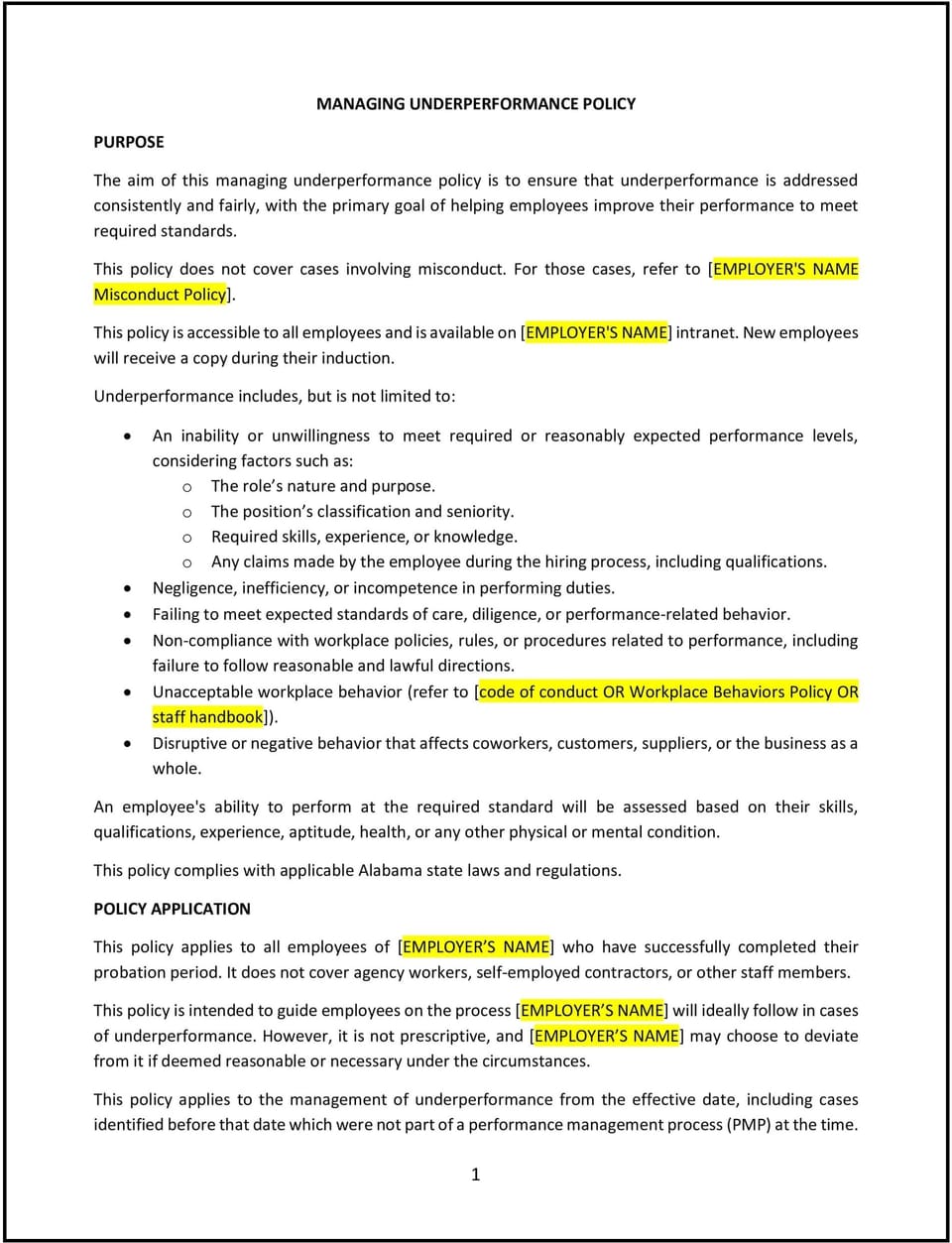Managing underperformance policy (Alabama): Free template

Managing underperformance policy (Alabama)
A managing underperformance policy provides a structured approach for addressing and improving employee performance issues. For SMBs in Alabama, this policy ensures that underperformance is managed consistently and fairly, offering employees clear expectations and support to meet their role requirements.
By outlining steps for identifying, addressing, and resolving performance concerns, this policy helps create a productive work environment and reduces potential legal or workplace disputes.
How to use this managing underperformance policy (Alabama)
- Define underperformance: Clearly state what constitutes underperformance, such as missed deadlines, low-quality work, or failure to meet job responsibilities.
- Set expectations: Establish clear performance standards and communicate these to employees during onboarding, reviews, and as part of this policy.
- Implement a review process: Include steps for supervisors to assess performance, identify gaps, and document concerns objectively.
- Develop improvement plans: Require managers to create performance improvement plans (PIPs) that outline specific goals, timelines, and support resources for employees.
- Address non-compliance: Detail the potential consequences of continued underperformance, such as further training, role adjustments, or disciplinary actions.
Benefits of using a managing underperformance policy (Alabama)
This policy ensures a structured and constructive approach to addressing underperformance. Here’s how it helps:
- Improves productivity: Encourages employees to meet performance expectations, contributing to overall business success.
- Promotes fairness: Ensures all employees are held to the same standards and given equal opportunities to improve.
- Reduces turnover: Offers employees the support and guidance needed to succeed, reducing premature terminations or resignations.
- Protects the business: Establishes a clear process for managing performance issues, reducing the risk of legal disputes.
- Builds morale: Demonstrates the company’s commitment to employee development and fairness.
Tips for implementing a managing underperformance policy (Alabama)
- Train managers: Provide training on recognizing underperformance, delivering constructive feedback, and implementing improvement plans.
- Document everything: Maintain detailed records of performance reviews, feedback sessions, and improvement plans to support transparency and accountability.
- Encourage open communication: Create an environment where employees feel comfortable discussing challenges and seeking support.
- Use measurable goals: Ensure improvement plans include specific, measurable, and time-bound objectives to track progress effectively.
- Follow up consistently: Schedule regular check-ins to review progress, provide additional guidance, and adjust plans as needed.
Q: What is considered underperformance under this policy?
A: Underperformance includes failing to meet job responsibilities, low productivity, substandard work quality, or difficulty adhering to workplace expectations.
Q: How should managers address underperformance initially?
A: Managers should hold a one-on-one discussion with the employee to understand challenges, provide feedback, and outline initial steps for improvement.
Q: What is a performance improvement plan (PIP)?
A: A PIP is a structured document outlining specific performance goals, timelines, and resources available to help the employee meet expectations.
Q: What happens if an employee doesn’t meet the goals in their PIP?
A: Continued underperformance may result in additional training, role reassignment, or disciplinary action, up to and including termination.
Q: How long does a PIP typically last?
A: A PIP duration varies but is often set between 30 and 90 days, depending on the performance issue and the goals outlined.
Q: Are employees allowed to dispute a PIP?
A: Employees can provide feedback or raise concerns about their PIP to HR or their supervisor for consideration during the process.
This article contains general legal information and does not contain legal advice. Cobrief is not a law firm or a substitute for an attorney or law firm. The law is complex and changes often. For legal advice, please ask a lawyer.


